
cod. 364.86
La ricerca ha estratto dal catalogo 24 titoli

cod. 364.86
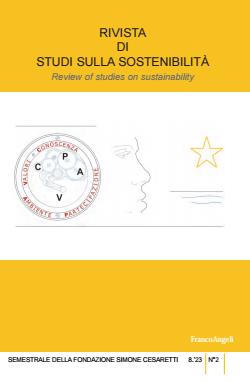
Food waste and obesity are both undesirable consequences of unsustainable food consumption styles. They represent urgent priorities to be addressed as well as hot topics for public debate. In this paper we argue that over-nutrition - the consumption of food beyond that which is necessary - can be regarded as a form of food waste. As such, it deserves attention as it generates the same economic, social and environmental impact as does food waste along the different stages of the food chain. In this study, the quantity of food waste hidden in over-nutrition to create overweight and obese Italians is estimated. By calculating the total excess calories consumed by overweight and obese people, it is possible to calculate the total quantity of excess food consumed by the Italian populace, corresponding to 2.67 trillion kcal per year. By converting this value into food quantity on the basis of a typical Italian diet, it was possible to estimate that 2.28 million tons of food is wasted annually. This figure is comparable to the quantity of food waste generated at the household level, as estimated by previous research quantifying food waste, thus confirming that policies focused on the promotion of sustainable consumption styles are crucial to address both the challenges of food waste and unhealthy food styles.
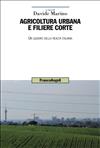
Un quadro della realtà italiana
Le diverse forme di filiere corte (farmers’ market, vendita diretta, box scheme, Gruppi di Acquisto Solidale e Community Supported Agricolture…) in cinque realtà urbane diversificate sotto il profilo territoriale. Dopo un quadro iniziale sulle relazioni che interessano i principali attori del mercato, il testo propone un percorso metodologico sperimentale per valutare la sostenibilità (ambientale, sociale ed economica) dei processi di produzione e consumo alla base di queste filiere corte.
cod. 1810.3.8

The organic sector has been subject to great attention for long time, both from a regulatory point of view as well as from a research one. More recently, starting to think about the territorial connotation of organic farming and the benefits it can generate, the opportunity of organic districts emerged. The main objective of this paper is to discuss what should be the goals of an organic district, how to geographically characterize it and what are the conditions so that it can effectively contribute to promote organic farming, local development and the territory. In order to create a real added value, in the broadest sense of the term, it should be created a brand that is able to translate the identity of the area in an image, which is clearly perceived by the target audience. This result requires a governance model and a strategic approach, which is well exemplified by the Marche region case, where a process of identification of potential districts and activation of local partnerships for the establishment and management of the areas has been carried out
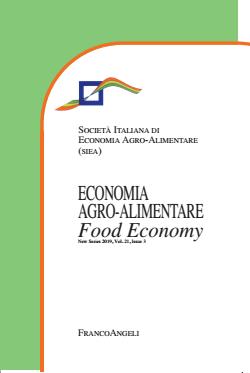
Consumers’ decisions are increasingly influenced by ethical issues. In the food domain it has led to the spread of alternative food supply chains. These innovative food networks, deaply embedded in the local domain, are characterized by a strong focus on food sustainability. Among them, the initiatives promoted and selforganized by consumers are particularly interesting as they disclose a high potential of fostering wider social changes. In this context, Solidarity Purchase Groups (called gas after the Italian acronym) emerge as spontaneous associations of consumers with strong ethical motivations including environmental, economic and social issues, which are fast-spreading in Italy. The aim of this paper is twofold. On the one hand, looking at consumers, we analyze the profile of the Italian consumers who participate to gass, in order to more precisely identify the target of these experiences, on the base of a large survey held in Italy on short food chain consumers; on the other hand, from a strategic and operational level, we discuss how these innovative supply chain models are organized, drawing from data retrieved for the 117 gas s operating in the city of Rome. The results show that gas participants have some specific features compared to consumers shopping in other alternative food chains, both in the socio-demographic profile and in their purchasing behavior, which is characterized by a strong ethical motivation. Looking at the organizational models of the gas s of Rome, the results of the survey confirm that the social dimension is very important in the management of these groups, as well as the principles at the base of their constitution, which very often refer to environmental concerns about farming techniques, social commitment to the local community and trust-based relations with the producers. Nevertheless, beside the social and environmental concerns, the economic dimension is still very important, as shared purchases most of the time results in a significant reduction in prices. The evidences confirm that the gas model represents a very interesting object of analysis for economists. Indeed, gas s are an unique example of completely demand-pull innovative food chain. Besides, they are able to involve consumers with specific needs and a strong ethical motivation underpinning the food purchase.

The sustainability of food systems is a topical issue in recent years, but the definition of this concept is still very unclear. This paper aims to face this challenge, in order to support a sustainability assessment of the food systems. Such a definition should tackle the underpinning dimensions of sustainability, i.e. the environmental, social and economic domains. Once the sustainability concept has been defined, an interpretative framework to assess food system sustainability can be proposed, and indicators to measure these issues are discussed. Many have already been tested at the operative level, but it remains unclear how to measure some social and economic issues. Suggestions on how to fill these gaps are discussed in the paper, so as to provide a more comprehensive understanding of how food systems sustainability may be measured in the practice.
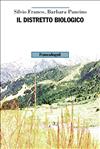
In un momento in cui la legge sui distretti biologici è in discussione nelle aule parlamentari e alcune regioni stanno valutando la possibilità di istituirli sul proprio territorio, questo volume vuole fare il punto sull’argomento discutendo le finalità di questo soggetto territoriale, la definizione della sua configurazione geografica e come esso possa efficacemente contribuire ai processi di sviluppo locale.
cod. 1810.2.34

Il turismo nelle aree rurali può rappresentare una vera e propria leva di sviluppo territoriale di lungo periodo. Con la domanda turistica sempre più orientata verso un "turismo dell’esperienza", però, la governance della destinazione è fondamentale e richiede un sistema di gestione in grado di integrare le componenti del sistema locale in un’offerta unica, che valorizzi le vocazioni e gli aspetti competitivi del territorio. In questo lavoro, partendo dal caso di un progetto riqualificazione turistica del borgo di Civita di Bagnoregio, si discuterà del ruolo della governance nella gestione delle destinazioni turistiche, analizzando come gli enti pubblici possono agire da promotori e facilitatori di questo processo, amplificando le ricadute sullo sviluppo socio-economico di tutta l’area rurale circostante.
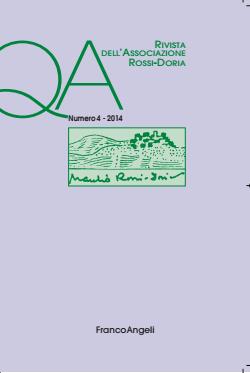
Filiere corte e sostenibilità: una rassegna degli impatti ambientali, sociali ed economici Negli ultimi anni l’interesse per le filiere corte è costantemente aumentato e sta trovando sempre più spazio nel dibattito istituzionale e scientifico. Questo contributo mira a identificare le implicazioni della filiera corta sulla sfera ambientale, sociale ed economica, così come emergono dall’esame della letteratura scientifica, istituzionale e "grigia" di diversi settori. L’impatto delle filiere corte su queste tre dimensioni della sostenibilità, laddove si evidenzino dei vantaggi significativi sulla qualità dello sviluppo locale e sul benessere delle comunità nelle aree rurali, giustifica l’opportunità di promuovere delle azioni in grado di sostenere e favorire la diffusione di questa forma di organizzazione delle filiere agroalimentari.
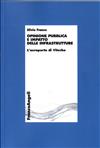
L'aeroporto di Viterbo
Il volume prende in esame la costruzione dell’aeroporto di Viterbo, caso emblematico di come le scelte infrastrutturali siano spesso il frutto di un processo scoordinato – nel quale si muovono attori con obiettivi e logiche diverse – che inevitabilmente genera soluzioni inefficienti che lasciano insoddisfatte molte componenti della comunità locale.
cod. 365.904
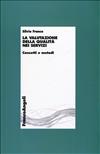
Concetti e metodi
Il volume, adatto non solo per gli studenti, ma anche per i responsabili della qualità di enti pubblici e imprese che operano nel settore dei servizi, affronta la valutazione della qualità dei servizi, analizzando le ragioni per le quali il monitoraggio della qualità rappresenta un elemento chiave nella prospettiva gestionale delle aziende che operano nel settore dei servizi.
cod. 364.184
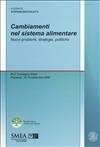
Nuovi problemi, strategie, politiche. XLVI Convegno Sidea, Piacenza, 16-19 settembre 2009
Gli Atti del XLVI Convegno di Studi della Società italiana di Economia agraria affrontano alcune tra le tematiche prevalenti nell’analisi economica del sistema agro-alimentare.
cod. 1610.59
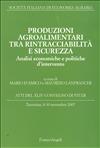
Analisi economiche e politiche d'intervento. Atti del XLIV Convegno di Studi. Taormina, 8-10 novembre 2007
Gli atti del XLIV Convegno della Società Italiana di Economia Agraria, su temi di particolare interesse relativi alla rintracciabilità e sicurezza delle produzioni agroalimentari. La continua ricerca della qualità e sicurezza alimentare è infatti l’unico elemento che può far ritrovare fiducia in una filiera agroalimentare che, in un passato non molto lontano, è stata caratterizzata da continue minacce per la salute e da diversi scandali.
cod. 1820.198
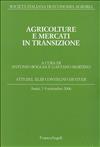
Atti del XLIII Convegno di studi. Assisi, 7-9 settembre 2006
Gli atti del XLIII Convegno annuale di studi della Società Italiana di Economia Agraria (Sidea) sul tema “Agricolture e mercati in transizione”. Con il termine transizione si intende riassumere le dinamiche operanti nelle agricolture europee e la profondità dei cambiamenti in corso, invitando anche a predisporre gli strumenti concettuali indispensabili a fronteggiarli.
cod. 1820.186

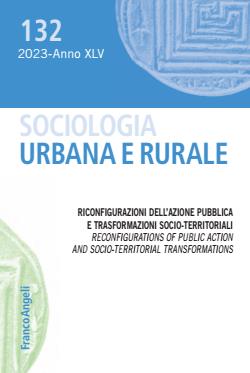
Bioregionalism is a model of social organization based on the feeling of belonging to a place. It can be read from two different perspectives; in the one examined in this paper, individual activities are strongly dependent on environment and natural cycles, and the economy of the community aims to reach a complete social and environmental sustainability. In the text, after presenting the ways to identify bioregions and confronting the ideological and the pragmatic approach to bioregionalism, individual motivations as well as social and political principles on which is based the community organization are pointed up. These last aspects will be discussed referring on social life and economical relations among members of a specific bioregional community.


Il ruolo dell'Italia. Atti del XL convegno di studi. Padova-Agripolis, 18-20 settembre 2003
cod. 1820.78

Atti del XXXVI Convegno di Studi. Milano, 9-11 settembre 1999
cod. 1820.61

cod. 365.257